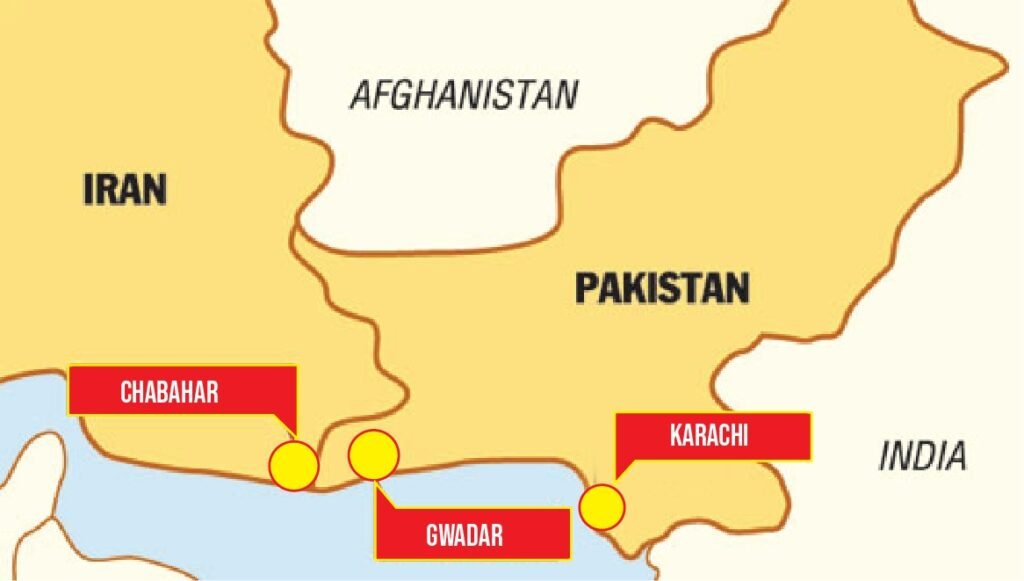In a historic move with far-reaching geopolitical implications, India recently signed a landmark deal with Iran, to operate the strategic port of Chabahar.
On 13 May, Delhi and Tehran inked a 10-year agreement that allows India to develop and operate Chabahar – Iran’s only oceanic port – and a vital transit hub for trade with landlocked Afghanistan and Central Asian countries.
You Can Also Read: US NOTE TO IRAN ON HOUTHIS HIGHLIGHTS DOUBLE STANDARDS
Chabahar is geo-strategically unique for India – it is the only Iranian port having direct access to the Indian Ocean and lies close to Afghanistan, Pakistan, as well as India. It is 650 and 936 nautical miles away from India’s Kandla and Mumbai ports respectively, and well connected to resource-rich Central Asia through the Chabahar-Zahedan railway (scheduled to open in 2025) and the India-built Delaram-Zaranj highway.

It opens up new markets for India’s exports and energy supply chains, while countering China’s growing influence in the region.
Yet, the deal comes with its own set of challenges.
Gamble or strategic move?
Within hours of the deal announcement, the United States warned India of possible sanctions.
“Any entity, anyone considering business deals with Iran – they need to be aware of the potential risks that they are opening themselves up to and the potential risk of sanctions,” warned Vedant Patel, Spokesperson of the US State Department.
US, a crucial ally of India, has hostile ties with Iran, and has already imposed more than 600 sanctions against Iran-related entities in the last three years.
But India has urged the US not to take a “narrow view” of the situation. “This is actually for everyone’s benefit. I don’t think people should take a narrow view of it,” Foreign Minister S Jaishankar said at a recent event in Kolkata.
According to Michael Kugelman, Director of the South Asia Institute at US-based think-tank The Wilson Centre, India has played both a gamble and made a strategic move with this deal.
“It’s a gamble because it subjects India to the risk, even if rather modest, of being sanctioned by the US, a key strategic partner,” he told PressXpress in a written interview. But it is also a “smart diplomatic move, because it counters China at a moment when Beijing has been scaling up ties with Iran in a big way and has eyed investments in Chabahar.”
– Michael Kugelman, Senior associate for South and Southeast Asia, Washington-based Woodrow Wilson Center for Scholars

Risk of US sanctions
India is downplaying tensions with the US and New Delhi is keen to “communicate the benefits” of the port deal to Washington.
However, India’s growing ties with Iran at this point in time could become contentious. Tehran’s support to Palestine in the Israel-Gaza conflict has invited even more US sanctions, and this could put New Delhi in a tight spot.
“With the US relationship with Iran as bad as it could possibly be, the US is in no mood for any country, even close partners, doing business with Iran,” says Kugelman.
But the agreement itself may not impact US-India ties.
Kugelman explains: “New Delhi has pursued commercial engagements with both Iran and Russia on different levels for many years, which didn’t impact the positive trajectory of US-India relations. Also, India’s decision to draw down its energy imports from Iran some years ago in deference to the US sanctions regime is a key factor at play, and it can also be a factor that protects India from sanctions.”
“The irony is that this agreement actually helps advance US interests,” he adds. “It pushes back against China and also facilitates the shipment of humanitarian aid to Afghanistan. These factors suggest that in a worst-case scenario where sanctions materialize, they would be relatively light.”
“But that would (also) mean all bets are off,” he says. “I doubt it’ll happen, but if it does, the US-India relationship could face its biggest test in years.”
Chabahar: Looking back
India first started talks on Chabahar with Iran back in 2003.
But a barrage of US sanctions targeting Iran prevented any real development.
The talks were revived in 2015, once the US eased sanctions under the Iran nuclear deal.
In 2016, India pledged to invest $500 million to develop the port – but in 2018, former US President Donald Trump withdrew from the nuclear deal and reintroduced “maximum pressure” sanctions on Tehran, which limited operations at the Chabahar Port.
“For years, the port of Chabahar has suffered from delays in its development,” says Alex Vatanka, Director of Iran Program at the Middle East Institute.
However, most of it is also about Iranian-Indian commercial disagreements and not just US sanctions, he adds. Speaking to PressXpress through an email interview, Vatanka pointed out that years ago, Washington had, in fact, “issued a waiver for India so it could develop Chabahar.”
“However, Iranian media are this week raising questions if the Americans are still willing to give Chabahar a waiver from sanctions,” he added.
“This American position is new. But it might be something that Washington will withdraw.”
– Alex Vatanka, Director, Iran Program; Senior Fellow, Frontier Europe

Vatanka calls the US move to impose any sanctions as “short-sighted”.
“It will really harm long-term American interests in Central Asia,” he added.
Playing the China card
Some analysts say the Chabahar deal is additionally a safeguard for India against rival China.
India has strained relations with China and Pakistan, and just four hours east of the Chabahar Port is Pakistan’s Gwadar Port, managed and controlled by China, which has pumped more than $1.5 billion in it since 2015.
The US has also been sticky of China’s growing influence in West Asia.
The Iranian regime heavily relies on China as its primary oil customer. And despite being only the 38th trading partner for China, Iranian authorities are often said to give big concessions to China – the latest being possible permissions to Beijing to even build housing units in Tehran.
Therefore, “India can definitely play the China card (in convincing US to waive off Chabahar deal from sanctions),” says Kabir Taneja, Fellow of Strategic Studies Programme at Observer Research Foundation (ORF).
“India’s trades or dealings with Iran are actually good for the US,” he told PressXpress in a voice note. “The fact that even when (the Indian foreign minister) went to Iran a couple of months ago, he first spoke with the US Secretary of State Antony Blinken just few hours before leaving… I am sure it involved some discussion about the Iran visit or maybe India carried some messages on behalf of the US to Iran.”
India’s access to Iran is of good utility to the US, Taneja added. “If the US is deft enough, they will recognize that it is actually not a terrible thing to give India some breathing space in its relation with Iran.”
– Kabir Taneja, Fellow, Strategic Studies Programme, Observer Research Foundation (ORF)

In doing this, the US would effectively counter China, feels Vatanka.
“The Americans would rather have the Indians in Chabahar than have the Chinese come in and become the main operator of Chabahar, which would be a geopolitical loss for Washington,” he told PressXpress.
“Not only do the Americans not want China to dominate Chabahar (and West Asia) but Washington wants India to compete with Chinese economic activities in broader Central Asian states, which port of Chabahar is supposed to service. Today, China is the biggest trading partner of Afghanistan and the Central Asian states but with American backing the Indians hope to be able to reduce Chinese market share in the region.”
He adds: “At least for the Biden administration, it seems that the bigger geopolitical prize is to keep China from dominating ports in Iran, and to help India compete with China in Central Asia. To sanction India for Chabahar would be a very short-sighted decision that will harm long-term American interests in Central Asia.”
And why sanction India when the Biden White House is already accepting that Iran sells oil to China, he questions.
Kugelman agrees. “India may play the China card,” he says, as it “can’t hurt to signal to Washington” that the US goals with US-China competition are advanced with this deal.
India-Iran-regional ties in spotlight
India-Iran ties have taken a hit amid decreased energy trade and India’s growing ties with Israel and Saudi Arabia, feels Kugelman. “In that regard, I actually think the Chabahar deal is a well-timed confidence building measure for India and Iran.”
India, Iran ties are also very complex by themselves, says Taneja. “The two countries have surveyed the possibilities of settling trade transactions in rupee-rial or through a barter system,” he explains.
“There has also been a long-standing demand of Iran to establish a banking mechanism. Iran has previously applied for permission to open Iranian bank branches in Mumbai, but I am not sure if there has been any change in the status there.”
“A lot of India’s outreach to Iran, especially Chabahar, is from its ‘Neighbourhood Policy’ perspective, not ‘West Asia Policy’ perspective,” Taneja explains.
“For India, Iran is very important on access to Central Asia and Afghanistan. The Afghan government of the Taliban has actually committed $35 million investment into the Chabahar port.”
Last year, Afghanistan’s economy chief Mullah Baradar visited the Chabahar port, urging Iran to facilitate easier access for Afghan trade through it.

According to Taneja, “Afghanistan wants to use Chabahar because of strained relations with Pakistan. India wants to offer them alternative to China-backed Pakistani ports like Karachi and Gwadar. So there are multiple points that play for India.”
“It’s not just about Chabahar. It’s about India’s national interests.”
A key geopolitical implication is that this may usher in a new phase of India-Pakistan competition.
According to Kugelman, these two rivals are both seeking to better access Central Asia.
“Pakistan wants to do it via Afghanistan. So does India, but Pakistan being to its West makes it difficult to do so via land, as it doesn’t give transit trade rights to India. With Chabahar, India can now focus on a new route that runs north through Iran, into Afghanistan, and onward into Central Asia.”
Of course, the big question is if India will make more headway in this effort now, after this new deal, given that progress on developing Chabahar was not great after an earlier Chabahar deal in 2016.
There are a lot of more trade routes coming up in the region, says Taneja. “But in my opinion, the more routes, the better, as it mitigates risk.”
China has also made attempts to gain an upper hand in Chabahar, proposing to use the port to construct a railway connection from China to Iran via Kyrgyzstan, Uzbekistan, and Turkmenistan to Tehran. Given the sheer potential of Chinese financing, especially compared to the more fickle nature of Indian investment, Iran may lean more towards China if it feels Beijing can better provide for its national interests.
“The Chabahar deal could both sharpen regional rivalry and enhance trade, but only if the project actually gets off the ground,” Kugelman concludes.


